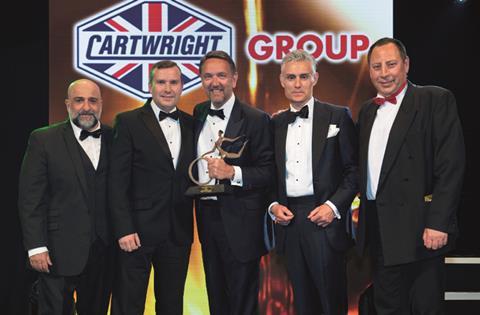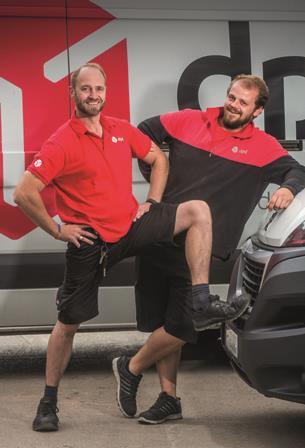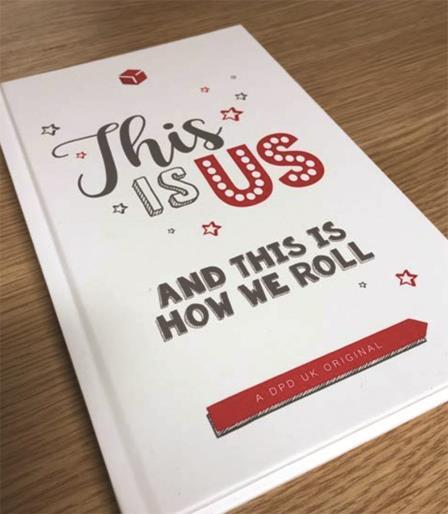
Winner DPD has written the book on home delivery, in the form of an ‘inspirational’ manual for employees explaining its corporate culture.
DPD UK’s winning entry for Home Delivery Operator of the Year at the Motor Transport Awards 2019 focused on five key areas: how new processes improved performance; how its app gives recipients more in-flight choices than any other carrier; the launch of the first zero-emissions delivery depot in Westminster; its health and safety track record; and how an “inspirational” book by CEO Dwain McDonald ‘This is us and this is how we roll’ “reminds Team DPD of the culture needed to remain the UK’s home delivery operator of choice”.
The judges said that while DPD was at “the top of its game” it was not afraid to critique itself, and one of them described the company as “one to watch”.
The foundations of DPD’s current success were laid almost a decade ago when it developed the Predict system and invented the one-hour delivery window, and since then it has certainly not rested on its laurels. One of its latest innovations that sets it apart is its consumer app.
The DPD app was launched in 2016, since when it has been downloaded by over 4m people. The rate of take-up shows no sign of slowing, with 25,000 people a week still downloading the app.
Consumers using it have access to a range of extra delivery and in-flight options to improve the chances of a successful first-time delivery.

“There are a number of benefits the app offers,” says director of marketing Tim Jones. “There are additional preferences you can tell us about; for example, you can tell us to avoid the school run period.”
Another feature is DesignSpace, DPD’s online community, where the company can generate and test ideas to improve its service. “That’s been a huge success story,” says Jones. “There are 40,000 people who have done that. We’ve already implemented lots of ideas that have come from DesignSpace.”
One example is ‘Prove Yourself’, which means people picking up a parcel from a depot now only need to show a bank card, rather than a driving licence or passport.
While it is unlikely that there will be another major breakthrough like Predict, DPD is always looking for incremental improvements to stay ahead. “We get to a point where we say, ‘we’ll come the next day, we’ll come within one hour, you can track our vehicle to your door, there are seven or eight in-flight options’. What else can you do?” says Jones. “It’s probably going to be little things and lots of ways that we keep making things better.
“We’ve always said we’ve got one thing to sell, and that’s service. To do that you’ve got to have operational excellence. People talk about innovation and the wow factor but you can’t do that without a sound operation.
“You need the investment in the depots. We talk about the one-hour window quite rightly but we can’t deliver unless we’re continually investing in new depots.
“When we launched Predict in 2009 we had 42 depots; now we have 65. At the time, we had two hubs with one under construction; now we’re looking at opening our fifth hub in the near future, plus building the network of all-electric micro depots in London.”
When it comes to electric vehicles, DPD has made no secret of its impatience with the vehicle OEMs over the slow speed of their introduction. Alongside its largely Mercedes-Benz Actros trunking fleet, DPD’s workhorse remains the 3.5 tonne van, and it runs around 8,000 diesel Sprinters.
When DPD opened what it claims was the UK’s first all-electric depot in Westminster in 2018, it had to rely on a variety of vehicle suppliers, including Mercedes-Benz Fuso (7.5-tonne eCanter), Nissan (eNV200s vans) and Paxster (200kg payload quads). It now has three all-electric sites, and plans a total of eight in central London, but is being held back by the shortage of suitable sites with adequate charging infrastructure as well as a lack of electric vans.
![DPD Paxster UDO [1]](https://d2cohhpa0jt4tw.cloudfront.net/Pictures/480xAny/0/2/7/11027_DPD-Paxster-UDO-1.jpg)
“There’s a massive future for electric vehicles,” says Jones. “We’ve invested heavily and will have 140 electric vehicles by the end of this year. We’ll double that next year and double that again the year after.
“We’d do a lot more with electric vehicles if the manufacturers were making more of them, if they were making more right-hand drive vehicles and if the charging infrastructure was invested in.
“A lot of our retail customers and consumers want emission-free deliveries, especially in city centres.”
Under DPD’s standard operating model most of its drivers are self-employed and run their own vans, but in London few homes have the infrastructure to charge electric vehicles so in Westminster they are all charged at the depot overnight.
“The point of the microsite is that it has the charging facilities and that works because they have maybe only 15 vehicles in there,” says Jones. “Other depots have 200 diesel vans operating out of them every day, which results in a massive carbon footprint.
“We need more microsites but they are difficult and expensive to acquire. It’s compounded by the fact that vehicles are so expensive and in such short supply.
“That’s why we’re calling for manufacturers to give us a more competitive price. Electric vehicles are typically three times the cost of a standard diesel and we’re buying as many as we can get.
“We have created a new role, general manager of corporate social responsibility, filled by Rob Fowler, who has built a lot of expertise in this area. He and his team will continue to explore all the options.”
Those options are unlikely to include driverless vehicles or drones any time soon.
“Drone delivery has its place,” says Jones. “For me it would be in the Australian outback where somebody needs a repeat prescription every month and it’s flown in.
“Other than that, if it’s raining, if there’s thunder and lightning, if it causes security panics when everyone sees drones near airports… a drone is never going to impact on UK deliveries. And the little robot that scoots along the pavement – same thing. A cyclist runs it over, a mobility scooter bumps into it, somebody gives it a good kick…
“There’s security in knowing that a human being, hopefully a smart one in a liveried van and a uniform, is coming down your drive, getting your signature and handing it over to you. It’s part of the feel-good experience of ordering a parcel and it coming the next day.”

This is how we roll
DPD’s award-winning service depends heavily on the commitment and motivation of its 13,000-strong workforce.
“That’s massively important,” confirms director of marketing Tim Jones. “That’s one of the reasons why, for many years, we had a programme within DPD called DNA. That's all about culture. In DPD customer care is not just in the call centre, everybody’s part of it. We have tried to cascade this culture pretty successfully over the past 10 years.”
To encapsulate this culture, CEO Dwain McDonald wrote a 142-page book, ‘This is us and this is how we roll’, which is given to all staff and new starters.
“It's not a textbook you have to sit down and read, but a highly engaging manual that talks about the core values, all the things that are important,” says Jones.
“It is about making people understand it isn't just taking a box to a door. It's the whole delivery experience and the feel-good factor on the doorstep.
“For new recruits, it says ‘this is what DPD is, this is what you’re getting into, this is what we expect, this is what we offer in return’. It gives them a clear idea what we want and how fast-moving it is. They understand that even before they join.
“That's been a big shift for us and helps with the retention as well as recruitment. We offer a wide range of employment options from owner-driver to employee-driver to worker status,” says Jones. “We have our ‘light’ drivers as well. These people have smaller vehicles with smaller daily volumes and the role is ideally suited to students, housewives and older people. They have the franchise to collect and deliver in their postcode area. It’s up to them how they do that. That's a great living for a lot of people.”
One effect of Brexit has been a drop in the number of eastern Europeans working in the logistics industry and this has seen wages rise for some operators.
“We pay everyone the same regardless of where they’re from, and we pay everybody at least the living wage,” says Jones. “It’s not as if we had a pool of workers on minimum wage. We’ve never done that and we have yet to see Brexit significantly impact on pay. The frustrating thing is we still don’t know whether there will be free movement and whether the people who are already here will continue to have the right to work.”
Winning ways
With 29 MT Awards wins under its belt as DPD and its previous incarnations Parceline and Interlink, DPDgroup UK is hot on the heels of all-time record winner TNT. As a former TNT marketing manager, DPD marketing director Tim Jones is determined to surpass TNT’s 33 trophies.
“Give us a couple more years,” he says. “[CEO] Dwain [McDonald]'s strategic plan runs up until 2025, and written into it is that we want to retain our Queen’s Award [for Innovation, received in 2015 for developing Predict and the one-hour delivery window] and we’re committed to entering the Motor Transport Awards every year.
“It’s all about recognition internally and externally. We see the Motor Transport Awards as the industry Oscars and as a way to benchmark ourselves against our competitors.”











